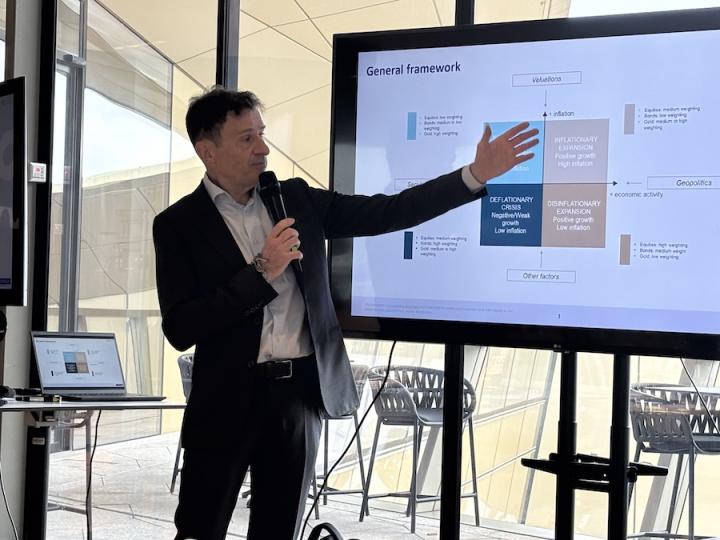
The difficulty in making any kind of financial forecast caused by the rapidly changing policies of newly-in-office right-wing US president Donald Trump got Banque de Luxembourg Investments’s cio Guy Wagner some sympathy during a recent lunchtime outlook event, co-presented with La Française, for local investors. But he also cannily inserted a slide showing parallels with high stock market valuations ending in a stock market collapse.
“We all know there is a new administration in the United States that is particularly unpredictable, and so it’s therefore extremely difficult today to build an economic scenario with any confidence,” Wagner told his audience, discussing Trump’s effort to raise tariffs against fellow North American countries and on China.
“You could say it creates more inflation, less growth, often and once more, the other side says it’s not about rising tariffs, it’s about deregulation returning—it’s difficult to get an idea about that,” he explained.
Vanishing volatility
He also pointed to what he saw as the disappearance in recent years of the volatility between expansions and contractions. “We had so much fear of a recession that we do everything we can, we try to manage the economic cycle with all the negative consequences that that entails.”
This explains why the business cycle may have become less important than it was in the past, he explained. “Growth volatility has become very low in the global growth of the United States, which is certainly not very strong, but is positive.”
Another factor, he explained, is the impact of demographics and the aging of the population. “It’s something we’ve been talking about for a long time—20 years ago, we were talking about it,” he pointed out. “But the consequences of the ageing of the population on public finances on the labour market were still very remote.” That has now changed, he said: “Today, we are in the middle of it.”
Return of geopolitics
The return of geopolitics is another element. “For a long time, the geopolitical side was not very important for a fund manager,” he said. “Today, clearly, the geopolitical side is becoming very important.”
All these elements make conventional thinking about market cycles less relevant, he explained. “It also means that you may have to think differently when dealing with asset classes.”
Today, we’re witnessing unprecedented performance in the US. We’ve seen over-performing stocks, he said, “but never what we have experienced in recent years.”
US is dominant
The American economy, today, represents less than 20 percent of the global economy, but the US market accounts for more than 50 percent of the global markets. “It’s something that we haven’t known since the end of the 80s.” He recalled how Japan at that point represented less than 10% of the economy, but 50 percent of the global market.
Today, with the Nifty15, 15 companies stocks represent 35 percent of the US market. Wagner pointed to a graph showing the number of companies in the S&P500 that outperform the index. The very low percentage, he pointed out, resembles in some ways the early 90s with its tech bubble. “There are a fair amount of differences, but still similarities with that time.”
Meanwhile, however, US stocks continue to out-trade stocks based in a variety of regions outside the US. “In Europe, we express this by the idea that America is exceptional.”
Examining the basis
This is based, Wagner explained, on three ideas. American growth is supposed to be structurally higher. While he allowed that it might be true, “it must be said that the stronger growth established in recent years is mainly due to a much higher fiscal deficit.” A second element is the US’s huge domestic market. “This is clearly true,” said Wagner, “but that hasn’t stopped Africa from underperforming.” The third element, which is the main one, according to Wagner, “is this idea that American economies dominate the digital economy.”
Troublingly for the rest of the world in need of investment, “American investors have stopped investing outside the United States.” Even if European markets are cheaper, European investors prefer to invest in the US, he explained.
Wagner expects the US dollar to be weaker at the end of this year. “Trump has said many times that the dollar is too strong, that the yen and the euro and other countries manipulate it.” This could see the eurozone situation improve dramatically, at the behest of the Americans.